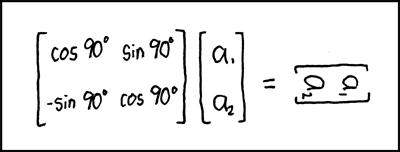1
2
3
4
5
6
7
8
9
10
11
12
13
14
15
16
17
18
19
20
21
22
23
24
25
26
27
28
29
30
31
32
33
34
35
36
37
38
39
40
41
42
43
44
45
46
47
48
49
50
51
52
53
54
55
56
57
58
59
60
61
62
63
64
65
66
67
68
69
70
71
72
73
74
75
76
77
78
79
80
81
82
83
84
85
86
87
88
89
90
91
92
93
94
95
96
97
98
99
100
101
102
103
104
105
106
107
108
109
110
111
112
113
114
115
116
117
118
119
120
121
122
123
124
125
126
127
128
129
130
131
132
133
134
135
136
137
138
139
140
141
142
143
144
145
146
147
148
149
150
151
152
153
154
155
156
157
158
159
160
161
162
163
164
165
166
167
168
169
170
171
172
173
174
175
176
177
178
179
180
181
182
183
184
185
186
187
188
189
190
191
192
193
194
195
196
197
198
199
200
201
202
203
204
205
206
207
|
PHPMatrix
==========
---
PHP Class for handling Matrices
[](http://travis-ci.org/MarkBaker/PHPMatrix)
[](https://xkcd.com/184/)
Matrix Transform
---
This library currently provides the following operations:
- addition
- direct sum
- subtraction
- multiplication
- division (using [A].[B]<sup>-1</sup>)
- division by
- division into
together with functions for
- adjoint
- antidiagonal
- cofactors
- determinant
- diagonal
- identity
- inverse
- minors
- trace
- transpose
- solve
Given Matrices A and B, calculate X for A.X = B
and classes for
- Decomposition
- LU Decomposition with partial row pivoting,
such that [P].[A] = [L].[U] and [A] = [P]<sup>|</sup>.[L].[U]
- QR Decomposition
such that [A] = [Q].[R]
## TO DO
- power() function
- Decomposition
- Cholesky Decomposition
- EigenValue Decomposition
- EigenValues
- EigenVectors
---
# Usage
To create a new Matrix object, provide an array as the constructor argument
```php
$grid = [
[16, 3, 2, 13],
[ 5, 10, 11, 8],
[ 9, 6, 7, 12],
[ 4, 15, 14, 1],
];
$matrix = new Matrix\Matrix($grid);
```
The `Builder` class provides helper methods for creating specific matrices, specifically an identity matrix of a specified size; or a matrix of a specified dimensions, with every cell containing a set value.
```php
$matrix = Matrix\Builder::createFilledMatrix(1, 5, 3);
```
Will create a matrix of 5 rows and 3 columns, filled with a `1` in every cell; while
```php
$matrix = Matrix\Builder::createIdentityMatrix(3);
```
will create a 3x3 identity matrix.
Matrix objects are immutable: whenever you call a method or pass a grid to a function that returns a matrix value, a new Matrix object will be returned, and the original will remain unchanged. This also allows you to chain multiple methods as you would for a fluent interface (as long as they are methods that will return a Matrix result).
## Performing Mathematical Operations
To perform mathematical operations with Matrices, you can call the appropriate method against a matrix value, passing other values as arguments
```php
$matrix1 = new Matrix\Matrix([
[2, 7, 6],
[9, 5, 1],
[4, 3, 8],
]);
$matrix2 = new Matrix\Matrix([
[1, 2, 3],
[4, 5, 6],
[7, 8, 9],
]);
var_dump($matrix1->multiply($matrix2)->toArray());
```
or pass all values to the appropriate function
```php
$matrix1 = new Matrix\Matrix([
[2, 7, 6],
[9, 5, 1],
[4, 3, 8],
]);
$matrix2 = new Matrix\Matrix([
[1, 2, 3],
[4, 5, 6],
[7, 8, 9],
]);
var_dump(Matrix\multiply($matrix1, $matrix2)->toArray());
```
You can pass in the arguments as Matrix objects, or as arrays.
If you want to perform the same operation against multiple values (e.g. to add three or more matrices), then you can pass multiple arguments to any of the operations.
## Using functions
When calling any of the available functions for a matrix value, you can either call the relevant method for the Matrix object
```php
$grid = [
[16, 3, 2, 13],
[ 5, 10, 11, 8],
[ 9, 6, 7, 12],
[ 4, 15, 14, 1],
];
$matrix = new Matrix\Matrix($grid);
echo $matrix->trace();
```
or you can call the function as you would in procedural code, passing the Matrix object as an argument
```php
$grid = [
[16, 3, 2, 13],
[ 5, 10, 11, 8],
[ 9, 6, 7, 12],
[ 4, 15, 14, 1],
];
$matrix = new Matrix\Matrix($grid);
echo Matrix\trace($matrix);
```
When called procedurally using the function, you can pass in the argument as a Matrix object, or as an array.
```php
$grid = [
[16, 3, 2, 13],
[ 5, 10, 11, 8],
[ 9, 6, 7, 12],
[ 4, 15, 14, 1],
];
echo Matrix\trace($grid);
```
As an alternative, it is also possible to call the method directly from the `Functions` class.
```php
$grid = [
[16, 3, 2, 13],
[ 5, 10, 11, 8],
[ 9, 6, 7, 12],
[ 4, 15, 14, 1],
];
$matrix = new Matrix\Matrix($grid);
echo Matrix\Functions::trace($matrix);
```
Used this way, methods must be called statically, and the argument must be the Matrix object, and cannot be an array.
## Decomposition
The library also provides classes for matrix decomposition. You can access these using
```php
$grid = [
[1, 2],
[3, 4],
];
$matrix = new Matrix\Matrix($grid);
$decomposition = new Matrix\Decomposition\QR($matrix);
$Q = $decomposition->getQ();
$R = $decomposition->getR();
```
or alternatively us the `Decomposition` factory, identifying which form of decomposition you want to use
```php
$grid = [
[1, 2],
[3, 4],
];
$matrix = new Matrix\Matrix($grid);
$decomposition = Matrix\Decomposition\Decomposition::decomposition(Matrix\Decomposition\Decomposition::QR, $matrix);
$Q = $decomposition->getQ();
$R = $decomposition->getR();
```
|
